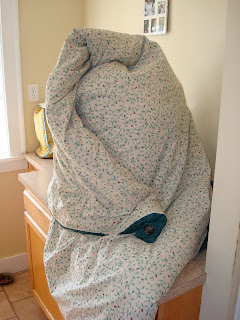I brewed my first all-grain beer on friday! I had a fantastic time brewing, much thanks to Aaron and Peter. I ended up using the recipe for the orange whit in my previous post as the basis for this beer, but with a few tweaks in an attempt to make it mine. (and because I wanted more orange flavor).
Grain Bill
- 6.5 lbs Maris Otter
- 4.5 lbs Flaked Wheat
- .5 lbs Rice Hulls
Hops
- 1 oz U.K. Kent Goldings (added at boil)
Yeast
- Wheat Beer Yeast SW 06 (I plan on recovering this yeast after secondary fermentation)
Extras
- 3/4 lbs light candy sugar
- 1 oz Coriander, crushed (added with five minutes left in boil)
- Zest from 1 lemon (added at flameout)
- Zest from 2 blood oranges (added at flameout)
- Zest from 1 blood orange (added to secondary fermentation)
- 3 oz. orange marmalade (added at flameout)
My grains, crushed and ready for mashing.
I forgot to take pictures until after I started mashing the grains, but here is the mash tun, all warm and cozy in a comforter.
It was about this time that Peter showed up, so we just stood around and drank some homebrew while waiting for conversion. After about an hour (during which I heated my sparge water, and boiled about 1.5 gallons of mashout water) we were ready to recirculate and drain off the mash.
Here we have already recirculated, and are just draining the mash. Next we added the sparge water and let it sit for another 30 min. to dissolve any remaining sugars.
Once I had filled my brew pot to 6 gallons it was time to boil. This beer was designed to be a 5 gallon batch, but I miscalculated the amount of sparge water I would need, and as a result ended up with about 3 gallons of wort left in my mash tun. Rather than just dump this extra, I decided to brew it up and see what would happen. I added just a little bit of the Kent Goldings hops during boil, and about 3 oz. of apricot preserves at flameout. After the boil I had about 2 gallons of beer left for fermentation. I pitched with recovered and washed Nottingham yeast that I had in my fridge.
Here is a picture just after I added the hops, and another from a different angle. The graniteware pot has about 3 gallons of wort from my over estimation of the volume of sparge water needed.

My boil lasted for about an hour and a half, based on a recommendation from Aaron that this style of beer could really benefit from a half hour pre-boil as well as also to boil off excess moisture. I wanted 5 gallons for my main batch, and between 2 and 2.5 for the smaller batch.
Once I had reduced the wort to 5 gallons I was ready to chill it and pitch the yeast. I originally thought that the larger carboy had a 6 gallon capacity, but after filling it with wort I realized that it must be over 7 gallons.
Original gravity for each beer: Main batch 1.060 mini batch 1.040.
The main batch is actually a little higher than I was aiming for so I am pretty excited to see how that turns out. I expect the mini batch will be a pretty good beer to have with meals, although it is really just an experiment so I won't be too terribly miffed if it doesn't turn out. However, if it works out well, I may try to duplicate my process in order to end up with extra wort for smaller easier drinking batches in the future. Two items to add to my wish list: a 3 gallon carboy and a 6.5 gallon carboy.
I have already pitched the yeast in my main batch here, and am filling the 5 gallon carboy
After pitching the yeast I brought both carboys down to my fermentation room (aka my furnace room) and their they will sit for the next couple of weeks. The mini batch will stay in primary until it is ready to bottle, while the main batch will go in to secondary fermentation after about one week. Once it goes into secondary I will add another orange worth of zest and bottle about two weeks after that.
Here are a 2 shots of my beer happily fermenting away.
-Foodstyle










No comments:
Post a Comment